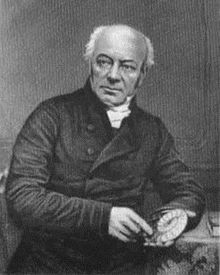William Buckland
| William Buckland | |
|---|---|

William Buckland, ca. 1845
|
|
| Born |
12 March 1784 Axminster, Devon, England |
| Died | 14 August 1856 (aged 72) Islip, Oxfordshire, England |
| Nationality | English |
| Fields | Palaeontology |
| Alma mater |
Winchester College Corpus Christi College |
| Known for | Megalosaurus, coprolites |
| Notable awards |
Copley Medal (1822) Wollaston Medal (1848) |
William Buckland DD FRS (12 March 1784 – 14 August 1856) was an English theologian who became Dean of Westminster. He was also a geologist and palaeontologist, writing the first full account of a fossil dinosaur, which he named Megalosaurus. His work proving that Kirkdale Cave had been a prehistoric hyena den, for which he was awarded the Copley Medal, was praised as an example of how scientific analysis could reconstruct events from the distant past. He was a pioneer in the use of fossilised faeces, for which he coined the term coprolites, to reconstruct ancient ecosystems.
Buckland was a proponent of the Gap Theory that interpreted the biblical account of Genesis as referring to two separate episodes of creation separated by a lengthy period; it emerged in the late 18th and early 19th centuries as a way to reconcile the scriptural account with discoveries in geology that suggested the earth was very old. Early in his career he believed that he had found geological evidence of the biblical flood, but later became convinced that the glaciation theory of Louis Agassiz provided a better explanation, and he played an important role in promoting that theory in Great Britain.
Buckland was born at Axminster in Devon and, as a child, would accompany his father, the Rector of Templeton and Trusham, on his walks where interest in road improvements led to collecting fossil shells, including ammonites, from the Jurassic lias rocks exposed in local quarries.
He was educated first at Blundell's School, Tiverton, Devon, and then at Winchester College, from where in 1801 he won a scholarship to study for the ministry at Corpus Christi College, Oxford, also attending the lectures of John Kidd on mineralogy and chemistry, as well as developing an interest in geology and carrying out field research on strata, during vacations. Having taken his BA in 1804, he went on to obtain his MA degree in 1808. He then became a Fellow of Corpus Christi in 1809, was ordained as a priest and continued to make frequent geological excursions, on horseback, to various parts of England, Scotland, Ireland and Wales. In 1813, he was appointed reader in mineralogy, in succession to John Kidd, giving lively and popular lectures with increasing emphasis on geology and palaeontology. As (unofficial) curator of the Ashmolean Museum, he built up collections, touring Europe and coming into contact with scientists including Georges Cuvier.
...
Wikipedia
